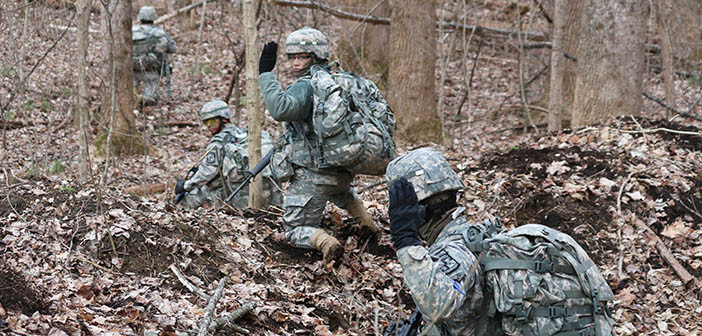Story and Photos By Jeff Keeling
On a cold, blustery Thursday last week, several dozen future U.S. Army officers ran, crawled and crept through the wooded hillside behind East Tennessee State University. Less than a year ago, many of those ROTC cadets weren’t sure ETSU’s program would even be in existence when they graduated. Now they know it will.
ETSU’s 63-year-old tradition of commissioning graduates as officers won’t end when 22 young men and women become 2nd Lieutenants this spring.
Such was the fear in the fall of 2013, when the Army announced it would close 13 ROTC programs nationwide – a decision that was reversed a couple of months ago.
“We’re seen as a strong program in ROTC, and we just want to get the word out that we’re not closing,” the program’s top officer, Lt. Col. Glen Howie, said Thursday, shortly before he joined cadets for their frigid reconnaissance exercise.
Not only is ETSU’s program staying put, Howie said its mission contracts through 2018 call for it to maintain a relatively high number of officer commissionings. To adjust to planned reductions in overall force levels, the Army has made a slight change in those contracts nationwide.
“With reduced force structure on the horizon there’s no longer a need for extra lieutenants,” Howie said.
Mission contracts set a number of officers each program is expected to produce each year. ETSU’s number this year is 15, so the program (which includes a partnership with the University of Virginia-Wise, whose cadets Howie oversees) will exceed that goal by seven. Those seniors contracted with ETSU’s program as sophomores. Next year, the contract calls for 16, and ETSU expects to commission 21.
Starting in 2017, ROTC programs no longer can commission an unlimited number of officers. Instead, schools will have a contract number set by the Army that is slightly above their commissioning requirement, to allow for students who may change majors and graduate later. For ETSU in 2017, those numbers – which apply to current sophomores – are 18 contracted students and a mission contract of 15.
Per Howie’s request, the Army raised those numbers to 16 and 19 for 2018.
“They looked at the strength of our program and what we’re producing consistently,” he said. “We did pretty well for 2018 relative to some of the other programs in our brigade, because of what we’re currently doing in our performance.”
Despite the period of uncertainty, Howie said, a large number of ETSU freshmen have taken military science courses this school year, and he expects a healthy number of them to sign for commissioning in 2018.
“The only year that really hurt was last (academic) year,” said Howie, who took command from Lt. Col. Daniel Bishop last May. “That’s when the word came out, and I think we lost some freshmen that year. We’ve got a strong freshmen class, and now they know there’s no danger of it shutting down.”
A groundswell of support arose in the immediate wake of the 2013 announcement. ETSU President Dr. Brian Noland and First District Congressman Phil Roe (R-Johnson City) both spoke out. Noland noted that the university’s ROTC enrollment was at one of its highest levels in a quarter century and promising efforts to protect the program.
Indeed, the number of officers being produced has been on the upswing. ETSU commissioned seven in 2007 and eight in 2008. Since then, with the exception of 2011, when just four officers were commissioned, the program has produced 15 officers in 2009, 2010 and 2013, 14 last year and 12 in 2012.
Thursday, Noland was clearly pleased with the good news. He said numerous site visits with regional and other command officers had gone well. “I feel very comfortable that our ROTC program is on solid ground, and it’s not only here to stay, I think you’ll see us grow the program. The questions that surrounded ROTC a year ago have been put to bed.”
Speaking of bed, potential cadets get out it pretty early during their freshmen years. Howie said prospective recruits are encouraged to sign up for the military science physical training class, which meets three days a week at 6:30 a.m. “That right there will give you a good indication of who’s serious about it.
“We’re trying to attract the best young students to come in who have an interest in serving in the Army, that are good scholars, good athletes and have leadership potential, so we can mold them as leaders throughout their experience here and show them how to become good Army officers.”
In addition to boasting strong enrollment figures, the program has won or placed highly at numerous ROTC competitions even through the uncertainty.
This year’s seniors, Howie said, “did very well in terms of those that wanted to get active duty and actually got it. The Army’s downsizing right now.” Some cadets commission out as officers in the Army Reserves or National Guard.
As someone responsible for grooming leaders, Howie is pleased with the program’s new lease on life and with its high level of performance. He also sees positives around the new, more competitive approach to contracting. It provides additional motivation to prospective officers, as Howie and his staff will consider students’ performance in academics, physical fitness and overall involvement in the program and extracurricular activities.
“We’ve been emphasizing to them, ‘hey, we’re going to have to be a little more selective,” Howie said. “We’re going to look at each cadet’s profile across the board because we have so many candidates. I think that will be good for the program and the students.”









